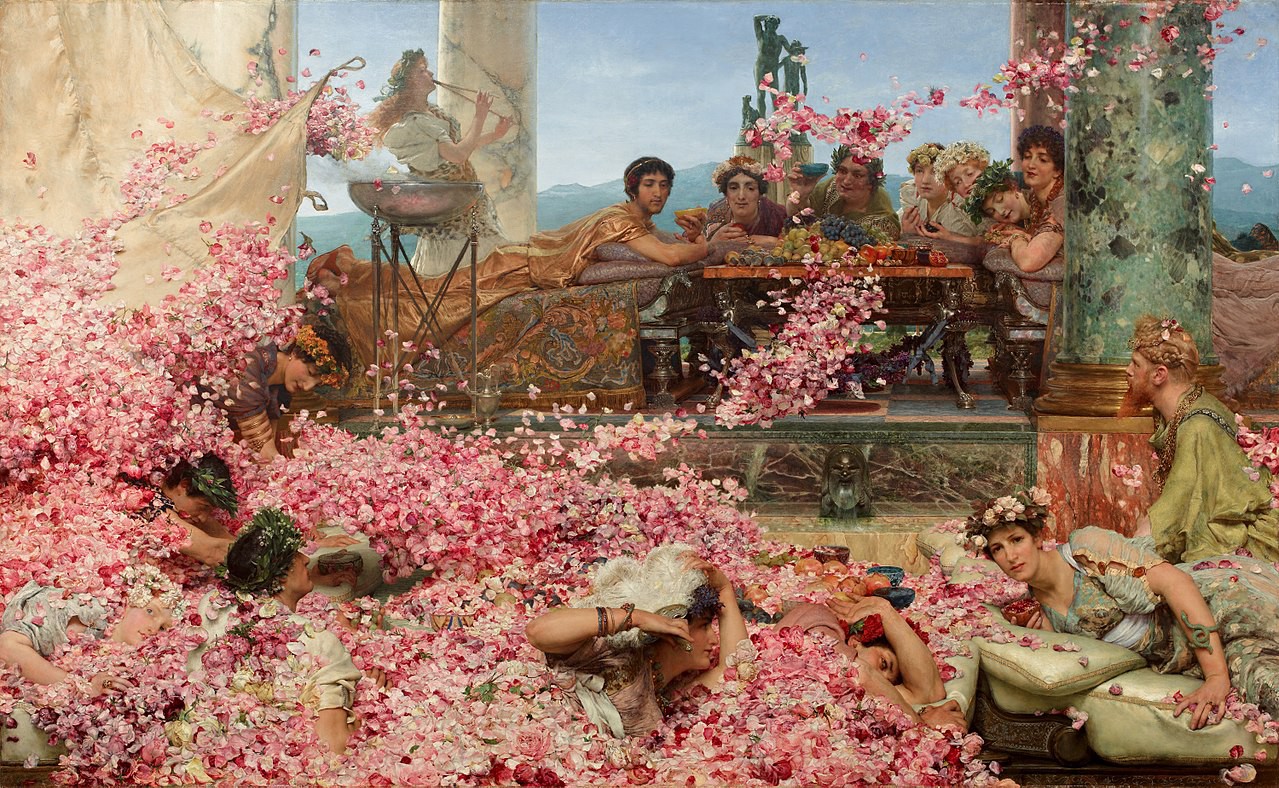In Ancient Rome, Smelling Good Made You Godlike

The city of Rome was a lot like its modern counterparts. There were shops, offices, and religious buildings. It was colorful too, with yellow, purple and red marble, and granite in shades of gray and pink. The architecture was elegant, the streets busy and the people loud. But let’s not overlook the other thing about Rome—it stunk.
Sure there were the spicy smells of the street vendors, myrrh from the temples, and when the wind was right some floral scents from nearby gardens. However, there was also fish from the fish stands, the stench of the toilets, sweat and oil from the gymnasium, and probably the most overpowering, the scent of death from the games at the Colosseum.
Don’t think the locals didn’t notice, or worse yet, that they didn’t care. In fact, Romans were pretty outspoken when it came to smells.
Oh, to Smell like the Gods
Romans often classified people by their scent. Bad smells, not surprisingly, equated you with the poorer class. Chamber-pots, fish, garlic, and onions were the smells the Roman poet Martial (who was way into smells,) used in his description of the poor.
For the rich, therefore, to smell good was more than just a nice idea, it was a symbol of their social position. The pleasure of perfume is among the most elegant and also most honorable enjoyments in life, said Pliny. And he was right. To smell nice was something reserved not just for the rich, but for the gods.
The graces in classical poetry are described as wearing garments scented with crocus, violet, hyacinth, and rose. Scents such as these were associated with a state of grace, youth, and beauty. Perfume was an attempt to recreate the scent of the gods, and when worn by mortals it gave them a share in their divinity. Maybe that’s why people often covered their entire body in thick, fragrant unguents or ointments. Not only might they put it on their hair, legs, breasts, and soles of the feet; they would use different scents in each area.
The Pick of the Perfume
It was after the conquest of Greece that Romans really got hooked on the idea of using perfume. Roman scents could come in the form of toilet waters, powders, unguents, or incense. Unguents were made in olive oil, although other oils such as almond were used as well. Any plant-based ingredient could be mixed with oil to create perfume: flowers, seeds. leaves, gums. There were also animal-derived ingredients such as musk, and ambergris which was secreted by sperm whales. These were commonly used as base notes in layered blends. One could wear melinum made from quince blossoms, metopium from bitter almonds or susinum made with lilies, calamus, sweet rush, costus, spikenard, amomum, myrrh and balm all mixed in a base of oil of ben. The possibilities were endless.
Goat Smells Need not Apply
Perfume was used by both men and women. If you asked Socrates, however, he would have said there was one type of smell fitting for men and that was oil from the gym. Julius Caesar would have disagreed. His favorite scent was said to be something called Telinum which supposedly smelled like a mix of Greek hay, sweet clover, and marjoram.
As for the women, those who were desirable smelled fragrant, undesirable women smelled foul; and old women, according to Martial, like goats. Despite the opinions of Socrates and Martial, men and women ventured outside the natural scents and even used similar fragrances. Both sexes enjoyed things like attar of roses, oil of cinnamon, myrrh, and spikenard. Saffron too was a highly popular scent. In fact, Emperor Elagabalus would swim in a pool scented with it.
Despite the Romans’ love of scent, too much perfume was just as much of a faux pas as smelling bad. Cynics were always ready to equate too much scent with an attempt to hide something foul.
Yet perfuming the body was also a method of promoting good health. According to the poet Alexis, the best way to be healthy “is to apply sweet scents unto the brain.”
Rubbing or pouring perfumes onto the body was believed to help fever, indigestion, and heart problems. It could even be used as a prophylactic for hangovers. One just had to anoint their head before drinking and the perfume would counteract the negative effects of the alcoholic fumes rising to the head.
Perfuming the Air
Now, the Romans didn’t invent perfume, far from it. They did, however, give us its name.
The word perfume comes from the Latin per fumum or through smoke. Not surprising, since incense was one of the most popular ways to scent the air. Incense burnt in the house was thought to protect it and the inhabitants from illness and misfortune.
Burnt in the storeroom, it could help keep unwanted critters out. Even clothes would be incensed in hopes of covering bad smells, some of which were unique to the upper class. The royal purple, for instance, came from snails and had the unfortunate habit of making clothes smell like dead fish.
In fact, if you wanted to insult someone you might say they smelled like fleece twice dyed in purple. Fleece would have had its own bad smell to begin with.
Of course, one of the most popular uses of incense was in the temples. The Etruscans had used incense as early as the 6th century BC, and Homer mentions the use of it in the temple of Aphrodite in Cyprus around 850 BC.
In Rome, frankincense, cinnamon, myrrh, and nard, were widely used in Imperial age temples, with frankincense and myrrh being the most popular. In fact, it’s estimated that over a million kilograms of frankincense came into Rome from the Arabian peninsula every year. This, incidentally, made the Arabians a fortune. Arabia Felix, happy Arabia, the Romans called it, because of the wonderful fragrances that came from there.
Swimming in Scent
If you wanted to make your home smell nice, there were other ways besides incense.
Wealthy citizens would have rubbed unguents on their walls, and mint leaves on their tables. Their floors would be sprinkled with fragrant waters and flowers.
The oil in their lamps would be perfumed, and in the winter they would be sure to throw some nicely scented wood into the fire. Cushions, which were filled with dried herbs and flowers, would have emitted their fragrance every time they sat down, and when they went to bed, they would smell the scented powders that were sprinkled between the bedsheets.
The use of perfumes in the dining room was another custom the Romans inherited from the Greeks. In fact, no banquet would have been complete without them.
If were you invited to dine with Emperor Nero, you’d be spoiled with scent. He had a particular fondness for roses. He, therefore, had silver pipes installed that allowed guests to be spritzed with rose water between courses. That’s impressive but not as impressive as his reversible ceiling which opened to drop flowers down on his guests. Of course, Emperor Elagabalus did that too. Only he is said to have lavished so many flowers on his guests he smothered them to death.
Scent for the Masses
The average citizen might not have been able to afford enough flowers to drown their guests in, but they were able to enjoy some sweet smells.
Cheaper varieties of perfume would have been available at the local perfumery. Besides the temples, people would be treated to the scent of saffron sprinkled on the stages of the local theater.
To combat the smell of dead animals and burning Christians, amphitheaters were equipped with cisterns that could be filled with perfumed water. This would be pumped into fountains or sprinkled on spectators.
When your time on earth was over, you’d go out nicely scented. Bodies were anointed with aromatic oils, incense offered to the gods, and perfumes in your funeral urn. Elagabalus must have loved it.
Notes and Sources:
Title picture The Roses of Heliogabalus, by Sir Lawrence Alma-Tadema. Image via Wikipedia
https://www.ancient.eu/Roman_Architecture/
https://www.acquadellelba.com/en/blog/2335-the-essence-of-the-sea-the-scent-of-history.html
Related Posts
How to Poison Like an Ancient Roman
Livia Drusilla, the devoted and loyal wife of Ceasar Augustus, was extremely supportive of…
January 16, 2020


Leave A Comment